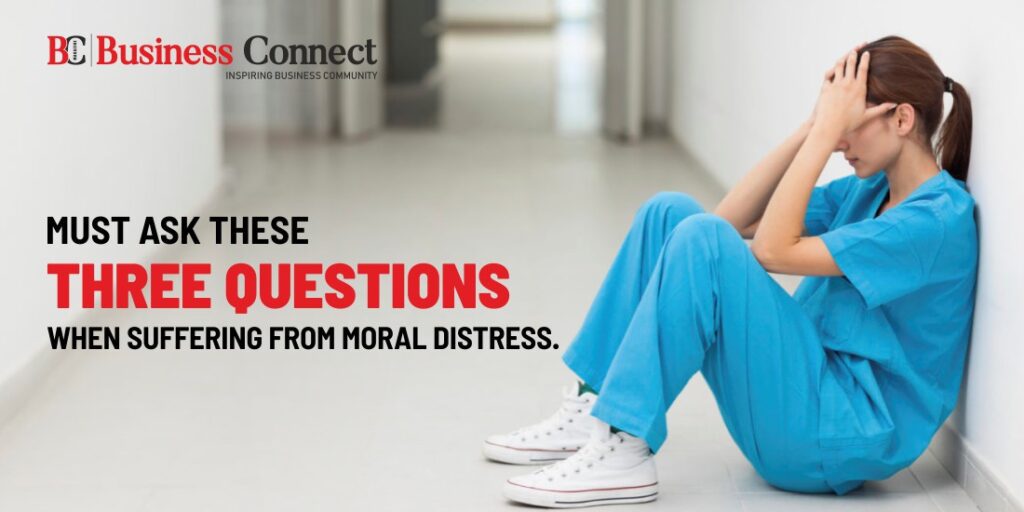Must Ask These Three Questions When Suffering from Moral Distress.
Although, India’s COVID-19 Infection graph has indeed declined since mid-sept. However, Covid-19 hospitalizing cases are rapidly rising in many other countries. In such situations, healthcare professionals are suffering from moral distress. Though this is not a surprising phenomenon because it has been around healthcare workers for years, and many discussions have happened.
Moral Distress has become a hot topic since the pandemic occurred. Now this pandemic is no longer a single country issue dealing only a few natation, but rather a global crisis. This turn of events has made moral distress a primary concern rather than an employment satisfaction issue.
Healthcare professionals describe their experiences by using different words like Overwhelming, Devastating, and Defeating. Some even suffer physical issues from it. This involvement is very different from what happens amid burnout, even if there may be symptomatic overlap.
When any individual endures from burnout, their fatigue is caused by the stress of prolonged demands. Removing that ones can thus minimize the burnout. On the contrary, Moral distress is caused by people making choices. It could be active or passive. Not Making a decision also causes moral distress.
It may come from past guilt, wishing, but distress typically comes from perception – it could be true or False – that one could have done something but didn’t. For instance, if you are watching a traumatic movie, you don’t usually get moral distress.
It is a completely different moral because it is about choice, acceptability, and empowerment. Extracting the requirement to make additional choices can not reduce the moral distress that happed by the choices you made.
Do not get confused between moral distress and moral anxiety because it is different form each other. Because of the previous act, people struggle with moral distress. While being worried or afraid of future decisions that you may have to make, are the key to get anxious.
These three questions can be a moral distress solution. They may even allow you to deal with anxiety.
What is going on with me?
This question is kind of toughy and more fundamentally. Toughy, because it makes you deal with obstacles that you currently encounter, and have experienced before. However, here is the clue. Very few experiences in life, even those suffering amid the Covid-19 pandemic, are entirely new. Even if an experience is unique, but it has the possibility that components of experience are acquainted.
Fundamentally, by identifying similarity and difference or new ways that acquainted components make up the present moment, you can rely on early experience to categories and understand your distress in a way that provides control the feeling and eliminate the fear of unknown.
Taking experiences and inspecting new components parts also allow to relieve distress more manageable. The point is, once you know what is going on with you, it becomes easier to know how to solve it. It may aid to relieve the feeling of overwhelm, devastation.
What do I want to do with it?
This is sort of more personal questions which nobody can answer for you. As moral distress comes from the choices you made, the solution involves recovering control over those choices. The moral question needs to be in a new frame to become one of personal value and professional one as well. Yet, in place of viewing value only as an obligation, it’s crucial to know that value entails choices. Usually, we manage our decisions on how to act, rather than viewing value-based norms forced on us.
It will be the most powerful and actionable question, which helps to make choices that you really can and would link to do. Your plan will account for your own strengths and challenges.
How do I approach it?
When you recognize something, what are you experiencing and what to do with it, now the next step is to understand how to approach a challenge, by doing this, will help to lessen moral distress in two ways. It allows you to consider whether your expectations – With respect to how you took action in the past or the plan you have just made for the future – are realistic or not.
Controlling expectations causes to reduce the distress since it stops us from considering you should have taken action a certain way but fell short. It also allows you to explore more than one option, so that you can’t get stuck in dilemmas by choosing between two bad choices or the all or nothing problem.
These questions are not intended to let the healthcare system and leaders off the hook to make work atmospheres that avert a situation where moral distress may occur. They only aid deal with real challenges just like many health workers are facing these days.



